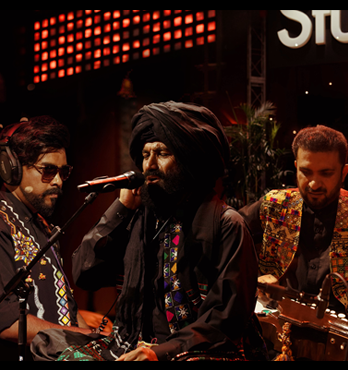Banur's Band

Usman Withd is a quiet presence, passionate about music, and driven by his desire to experiment with the traditional sounds of Balochi and Pashto music that he has grown up around. Nervous when he visits Coke Studio for his first rehearsal, he tries his best to avoid giving an interview. As he begins to talk, however, his love for the creation of music shines through.
“I’ve always wanted to design a sound in Balochi music that reaches people and demonstrates something new,” he begins, as he opens up to the camera.
Usman has been playing and composing music for 16 years now, having started his musical learning after he completed his Matriculation. He was first inspired to venture into music by Sohail Keys, a well-known keyboardist and music producer in Quetta. Usman would hear Sohail perform at live performances but was too shy to approach him.
“I was really hesitant to talk to him and just couldn’t bring myself to do it.” When Usman finally did contact Sohail, it was through his uncle, who was a friend of Sohail’s and set up a meeting between the two. When they met, Sohail agreed to take Usman on as a student. Usman gave up on further studies and dedicated all his time to music, starting with the very basics. “Din raat ek kar deeya” (day and night merged into one), he says of those first years of musical training, “There were times when the night would pass and a new day would dawn and I would have no idea, for days at a time.” At first, Usman couldn’t afford a keyboard of his own; when he didn’t have access to one, he would sketch the keys out on flat surfaces and practice on them, so he could build the muscle memory needed to master the instrument.
Usman now runs a studio in Quetta by the name of Melodia Productions, where he has composed and produced songs for the likes of Akhtar Chanal. It was here that Usman first met Chakar Baloch, a benjo player and songwriter from Panjgur, who came to the production house with a song that he wanted to record. The two hit it off immediately, Chakar says, “When I met Usman Bhai, my concept of music changed, he showed me new aspects to music. From our first meeting, we formed a blood bond. He is my ustad, he defines musical concepts for me and I keep asking him about musical theories. He is always teaching me something or the other.” Usman and Chakar consider each other family now and work together regularly, drawn together by their desire to reinvent Balochi music in contemporary colors and sounds.
Chakar came into music relatively late in life — even though his heart was in the craft since he began to form his first memories. Music was a regular part of his family life; his uncle, Altaf Sajid, is a benjo player and Chakar’s early childhood memories are filled with the notes of his uncle’s benjo and the melodies that were so dearly loved by his entire family. “Since I opened my eyes in the world, the sound of the benjo has been coming to my ears. I feel like music is in my blood, a part of my upbringing. I sometimes say that the chaska (love) for music became a part of me while I was still in my mother’s womb.”
Chakar was only in nursery when he first felt a pang to learn the benjo but, for some twenty years, the instrument remained just beyond his reach. Altaf, his uncle, insisted that he finish his Matriculation before he began any sort of musical learning and Chakar complied. “I was listening to music and was learning in the process, but my uncle didn’t give me permission to properly study the instrument.”
When his Matriculation ended, a hopeful Chakar approached his uncle for permission but was told to complete his university education and, once this additional condition was fulfilled, to work and obtain a Master’s degree. Chakar and his friends would gather at Panjgur’s Dawood Baloch Hotel in the evenings which used to be filled with musicians and singers — their instruments and voices inevitably joining in the recreational music making. Chakar would also take part by using other people’s instruments; at times even correcting his friends’ techniques, having learnt by observing and listening. This was done in secret and, if his uncle were to come around, Chakar would immediately stop — his obedience of his uncle trumping his love for music.
In the Ramadan of 2009, Chakar finally went rogue and bought a benjo without telling his uncle, swearing his friends to secrecy. He began to teach himself the basics, starting with rhythm and tempo. He finally had his own instrument that he could play when he gathered with his friends, but it was quickly hidden when his uncle was present. Chakar’s secret was inevitably found out and he was summoned by his uncle who, finally, agreed to teach him, and so, ten years ago, Chakar’s formal training in music began. Chakar now appreciates the value of his uncle’s insight — his academic education, which led to two Master’s degrees, in Sociology and Engineering, helped him develop an aptitude for research and a depth of understanding that he now applies to music. Chakar is always researching the history and traditions of Balochi music, as well as those of neighboring cultures, reading books, speaking to scholars and musicians, and applying what he learns to the music he creates with Usman.
Chakar has another relative with an uncanny talent for music. Some five years ago, Chakar’s uncle, SM Baloch, was visiting Quetta for some work and stopped by Usman’s studio one evening. In the gathering of musicians, SM Baloch, or ‘Uncle’ as his bandmates call him, began to sing, at some point launching into a zahirok — the scales on which Balochi music are made, much like the raags of Eastern Classical music. “When he sang the zahirok, I was shocked, I said, ‘what is this?’ I record a lot of people, but when Uncle sang, he just ... ” Usman says expressing how he was speechless at first.
SM Baloch says he has been singing, “Jub se main ne hosh sambhala hai” (since I have gained consciousness). As a child, his voice was loved by his elders, who would often have little Baloch sing for them at family gatherings. As he grew older, Baloch came to love the past time, singing as he worked, on his motorcycle during his commute, while manning his shop in Panjgur. As Chakar recalls, “Since my childhood, wherever I saw Uncle, he would be singing all the time.” Baloch would sing in Farsi, Dari, Balochi and Urdu; he would sing the tunes of Ghulam Ali, Pankaj Udas, and Muhammad Rafi — all the greats that have sung in the Subcontinent.
Wherever Baloch sang, he received appreciation. During a train ride to Lahore with his nephew, Baloch was passing the time by singing and was overheard by a fellow passenger who was taken by his voice. She approached Chakar and requested another song, “I said okay, challo, I’ll sing another song for you since she really enjoyed it. She asked me where I was going and, God forgive me, I lied and said I’m going for a concert to Lahore and my nephew is my instrumentalist.” Baloch’s conscience eventually led him to confess the truth to the passenger, but this was not to be the only time his singing garnered him attention.
During his time in the Rangers, Baloch applied for a posting in Karachi — during his interview he told the senior officer about his hobby and was told to sing, with the promise that he would get his posting if his voice impressed. Baloch sang two songs for the officer, in Balochi and Urdu. “Where were you all this time?” the officer asked him giving him the posting on the spot.
Despite the joy singing brought him, Baloch kept his voice to himself for much of his life — out of respect for his parents who saw singing as a sin, being from a religiously conservative society. “My father forbade me from singing and said that it was a sin … when my parents were alive, I didn’t want to make them angry.” After his parents had left this world, Baloch still struggled, society’s views on music leading to an inner conflict that caused him to turn away from his hobby. “When someone scares you in the name of God, you are easily frightened.”
Over the years, Baloch met musicians and other people who put his inner conflict at ease. In Iran, Baloch met a maulvi: “In his socks, he had a khanjar (knife), and a pistol in his pocket. He would make me sing and dance.” Baloch’s voice held sway over the maulvi, who once said to Baloch, “You must keep singing, your voice is so beautiful, there’s nothing like it. I send a curse upon you if you don’t sing. God has gifted you with sur. If you don’t sing, you’ll have to answer to Him. If singing is a sin, I will answer for you on the Day of Judgement.”
When Baloch came to Usman’s studio, the producer knew immediately that he wanted to make music out of the sur in Baloch’s voice. Chakar and Usman convinced Baloch that the world deserved to hear the melodies and tones that he carried inside himself and so, three stories converged to form Banur’s Band.
Banur’s Band represents the Baloch people’s attachment to music, the way they are drawn to it, no matter what stands in their way. “We’ve worked in really hard times too,” says Usman, “In 2014, we would be working in the studio, and there would be firing going on outside and someone would die downstairs. What can you do in this situation, what can you compose? But I never gave up. If I’m going to do anything, it’s going to be music, I’ve invested everything in this.”
In Pangur, Chakar has witnessed similar situations, “There’s been incidents when bodies have fallen in the day, but there’s a musical gathering at night. The more music is suppressed, the more it blooms. No matter what the situation is, music has never been lost, music is alive. No matter what halaat come down upon the Baloch, they do not let go of the daman of music.”
There is not a single evening in Pangur that goes without a musical gathering, says Chakar. People gather at hotels to sing, bringing their instruments and voices whenever they sit down together. On picnics, along with the usual selection of food in picnic baskets, families take their rababs and benjos, since music is an integral part of their recreation. “Music is a part of our life in every aspect,” say Chakar, to celebrate weddings, when a baby is born into a Baloch household, and even at funerals, to mark the passing of life and the cycle of death and rebirth. Ingrained into their lives, a constant companion in their joy and grief, music continues to flourish and grow in Balochistan, telling the stories of the Baloch people.
